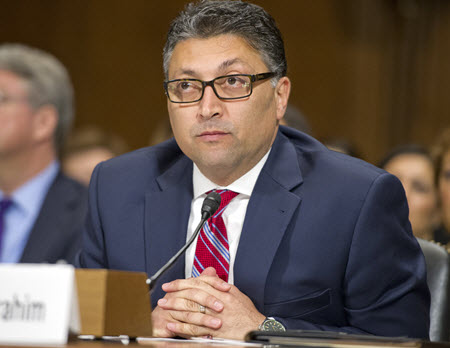Delrahim Lays Groundwork for Divestiture
The smarter way to stay on top of the multichannel video marketplace. Sign up below.
You are now subscribed
Your newsletter sign-up was successful

WASHINGTON — The Justice Department’s new antitrust chief, Makan Delrahim, may not have talked specifics during a speech discussing his theory of antitrust merger reviews, but he sent clear signals that divestitures are a cleaner, more deregulatory fix for problematic deals. That ultimately could translate into a trip to court by AT&T.
Delrahim did not talk about the AT&T-Time Warner deal in a speech he gave to the American Bar Association in Washington on Nov. 16, though he did mention Time Warner Cable.
He signaled he is more partial to applying structural conditions such as divestitures than to imposing behavioral conditions before allowing a merger that, absent those conditions, would be illegal.
That could indicate the department is indeed planning to seek structural conditions in the AT&T-Time Warner deal, of divesting either the Turner programming assets or DirecTV, rather than allowing the combined company to keep all assets but agree not to use its clout of owning and distributing high-value content to disadvantage competitors.
Related > AT&T-Time Warner: Missed Connection?
The approach could also be a way to publicly justify divestiture requirements outside of the heated political context of President Donald Trump’s attacks on Turner’s CNN and suggestions that a DOJ divestiture requirement would stem not from reasonable antitrust theory and the facts of the merger but from political retaliation by proxy.
One veteran attorney told Multichannel News he had no doubt that if Delrahim or others at the department felt such political pressure, they would resign rather than bow to it, and that there were indeed solid reasons for a divestiture.
“[A]t times, antitrust enforcers have experimented with allowing illegal mergers to proceed subject to behavioral commitments,” Delrahim said, citing the Comcast-NBCU deal as one example, according to a published transcript of his remarks. “That approach is fundamentally regulatory, imposing ongoing government oversight on what should preferably be a free market. And, as 11 senators wrote to the Attorney General earlier this year, the ‘lack of enforceability and reliability of such conditions [can] render them insufficient’ to protect consumers. As we reduce regulation across the government, I expect to cut back on the number of long-term consent decrees we have in place and to return to the preferred focus on structural relief to remedy mergers that violate the law and harm consumers.”
Delrahim suggested that behavioral conditions, though justifiable in some circumstances, are particularly tough to craft and enforce. “[H]ow can antitrust lawyers hope to write rules that distort competitive incentives just enough to undo the damage done by a merger, for years to come? I don’t think I’m smart enough to do that.”
He also invoked the would-be Comcast-Time Warner Cable merger, which collapsed in April of 2015 despite the reigning wisdom that both the DOJ and the Federal Communications Commission would approve it with behavioral conditions.
AT&T has vowed to fight any divestiture. It has likely already signaled to the Justice Department it wants to close the transaction — it must give the government 30 days’ notice — which would force the DOJ’s hand.
The smarter way to stay on top of the multichannel video marketplace. Sign up below.
Contributing editor John Eggerton has been an editor and/or writer on media regulation, legislation and policy for over four decades, including covering the FCC, FTC, Congress, the major media trade associations, and the federal courts. In addition to Multichannel News and Broadcasting + Cable, his work has appeared in Radio World, TV Technology, TV Fax, This Week in Consumer Electronics, Variety and the Encyclopedia Britannica.

